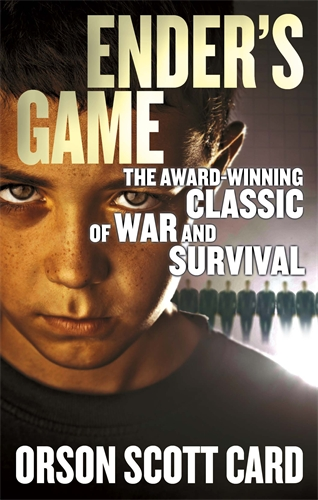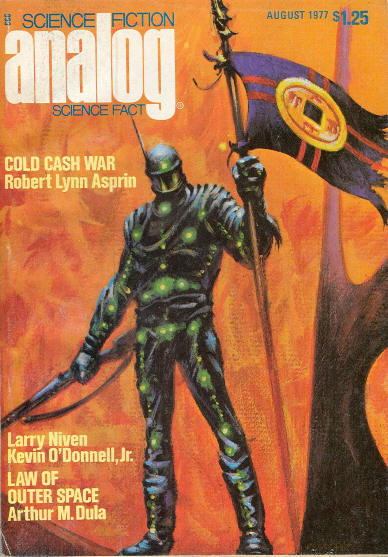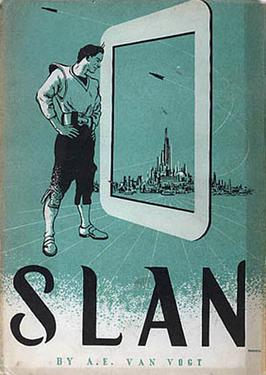
Ender’s Game by Orson Scott Card
Originally published in a shorter form in 1977, and as a novel 1985; updated 1991.
Film tie-in edition released October 2013.
ISBN: 978-0356501888
352 pages
Review by Mark Yon.
With a film of this book coming out in November that looks rather good, I thought that the book itself was worth a re-read.
I did read it in the 1980’s, which makes it about 30 years or so since I last read it. (I think I first read it as the novelette that became the novel, courtesy of Analog Magazine, in August 1977.)

And my initial thought is that there’s a lot here I’ve forgotten.
In the time since my last read, over the last thirty years, things have changed a lot in SF, as you might expect. Since its initial publication Ender’s Game has become a very popular read. Many schools in the US have it on their reading lists, it’s never been out of print since its publication and let’s not forget both its Nebula Award in 1985 and Hugo Award in 1986 for Best Novel. Estimates suggest that it has sold more than a million copies and this number will no doubt rise due to the increased awareness created by the film. (See also Isaac Asimov’s I, Robot, which actually had little to do with the film plot.) So in a detached manner I was interested as to whether the book was worth reading and to try and deduce what the reasons are for its growth in popularity, especially as a Young Adult book, which is where it seems to be these days.
To the plot, then. Ender Wiggins who, at the age of six, is a child prodigy taken from his family to train at Battle School. Humans are currently fighting a losing battle against ‘the buggers’, whose last visit to Earth left it decimated. The only future is the young, like Ender, who are trained in tactics against each other in readiness for the next battle. The training is hard and brutal, and the challenge, not to mention the risks, is high.
The plot is clearly a plus point, and quite exciting as Ender trains, learns and leads attacks in simulation against the enemy. The ending is not what many readers expect and that too can be a bonus in a book which, at first glance, is generally rather generic.
Ender’s Game is a story about character with some SF trappings. Whilst there are spaceships and aliens, it is really more about adolescence and rite of passage and growing up, something which most of us recognise.
We also get some interesting, if not unusual, views on religion, race and warfare along the way. Our future is not an easy place to live in. It is mentioned that Ender’s mother has to give up her Mormon upbringing and his father his Polish ancestry as part of the agreement for giving birth, as the third child, to Ender, circumventing the law to have him.
In terms of race there’s also some points made along the way. Card’s mention of a predominantly Jewish troop that Ender meets in training (“the Kike Force”, led by Rose the Nose) and the point that Jews were seen as a lucky group, with also having had “an American Jew… as President and Hegemon of the Alliance”, which highlights that possibly racism is still alive and well in the future. It is one of the motivations for creating outsiders, which Battle School seems to need in order to win.
If you can read the book without taking on the personal views of the writer, which have recently resurfaced, (see HERE and HERE), as most readers would do, I guess, I can see why it is popular.  The book’s quite readable, it’s key ideas are understandable and it’s clearly appealing to anyone who has ever felt themselves to be an outsider, in the same way that the Twilight series or, going back further, A E van Vogt’s Slan, have done. (Slan, on its publication, became a rallying point for SF readers in the 1940’s and 50’s.)
The book’s quite readable, it’s key ideas are understandable and it’s clearly appealing to anyone who has ever felt themselves to be an outsider, in the same way that the Twilight series or, going back further, A E van Vogt’s Slan, have done. (Slan, on its publication, became a rallying point for SF readers in the 1940’s and 50’s.)
Most importantly, I think that Ender’s Game’s popularity may be that it deals with issues that have or will affect all of us at some time in our lives – at school, work or home. There are a few key concepts which run through the novel, which are decidedly non-SF and yet the reader can identify with. They seem to be:
1) Children are our future.
2) Time at school is brutal.
3) Life is hard, the challenge is difficult, yet worthwhile.
4) As readers, we like an underdog.
The book is not so much about warfare, as the social and psychological effects of warfare. Ender’s rather dysfunctional relationship with his family leads him to rely on his fellow comrades-in-arms rather than the familial. One of the points made by Graff in the book is that as part of his training Ender must learn that he can rely on no-one. The idea that to be a leader, you must be made a monster, is one that will sit uncomfortably with some readers, be identified with by others and be generally seen as a truism by others.
The idea that stays with me most at the end of the novel is that it is mainly a book about bullying – bullying to survive, but also bullying to maintain a position once achieved. It’s tough at the top, yet someone (ie: the children) have to do it. In the school of hard-knocks, that seems to be both traditional school and Battle School, Ender is both a reluctant yet willing participant. And this is something a reader can both identify with and be repulsed by.
Similarly, as a reader, we do like an underdog. Orson manages to make us feel as if we want to side with Ender, whilst not necessarily liking some of the things he has to do in order to survive.
And the ending neatly subverts what we would expect the outcome of the novel to be. Where we expect victory, it isn’t what we expect.

I think it’ll be interesting to see how much of the book is used in the film. There’s a lot of people out there who will think that Ender’s Game is a ‘Hunger Games’ rip-off, in the same way that Bram Stoker plagiarised those Twilight books, or John Carter copied Star Wars… which is rather unfair. One of the things I find on this reread is how much more there is to this book than I remembered, and not all of it I feel comfortable with. But if it makes you think, even if you disagree with it, that can’t be a bad thing.
In the end, Ender’s Game is a book that deserves its popularity. At one level it is emotionally engaging, quite exciting and readable, and it is this that makes it most engaging to younger readers. As an older reader, and delving deeper, there may be some elements that may leave you a little uncomfortable after you finish it.
If nothing else, the book makes you think after you’ve finished reading it, even if you don’t agree with what is said. Let’s hope the film generates a similar response.
Mark Yon, August-October 2013.





I just read Ender’s Game for the first time this year and I really liked the story. The justifying of violence is still the part I struggle with the most. He’s basically emphasizing the need for character traits that are usually described as “evil.”
There are a lot of arguments that could be made out of the questions that come from the way Card treats violence in the book… and that for me is what makes the story so fascinating and so complicated. You never really know how to feel about the ending of this story and the decisions Ender makes.
Also, I hope you’re wrong about people thinking Ender’s Game is a Hunger Games rip off, that would just be sad. 🙂
Thanks, TB. The justification of violence is one of the issues that I can see would cause reader’s difficulties, and was one of the elements I was alluding to here. It comes across at times as ‘to be the best, you have to beat your way to the top”; something that is repeated both in Ender’s actions and in the battles at Battle School.
As for the Hunger Games rip-off issue: well, we’ve had similar comments made before (John Carter rips off Star Wars, despite being published 60 years before the films is an example!) There are others. I guess my point is that whilst there are similarities, it would be an unfair judgement. You could just as easily claim that The Hunger Games ripped off Battle Royale!
Thanks for your comments.
Weird, I put my name in as The_Wanderer and it came up as The Bears…. that’s a good name,too. Oh well.
Suzanne Collins claims she didn’t know about Battle Royale until after she published Hunger Games, but those two are so similar… she’s lucky that didn’t/hasn’t ended in a lawsuit.
We did a review of Ender’s Game, too, which I forgot to mention in my last comment. I linked it below if you want to read it.
http://atg-reviews.com/books-and-comics/enders-game-book-review/
Thanks for that link to the review: hadn’t seen it.